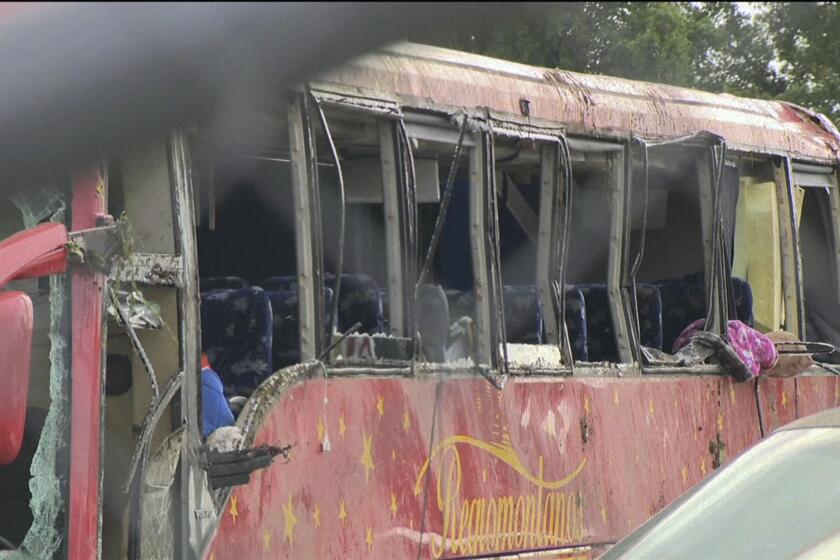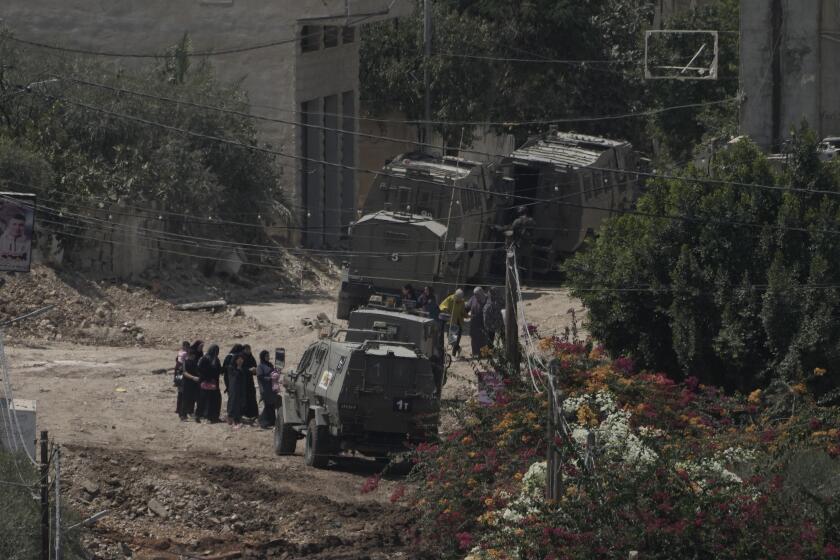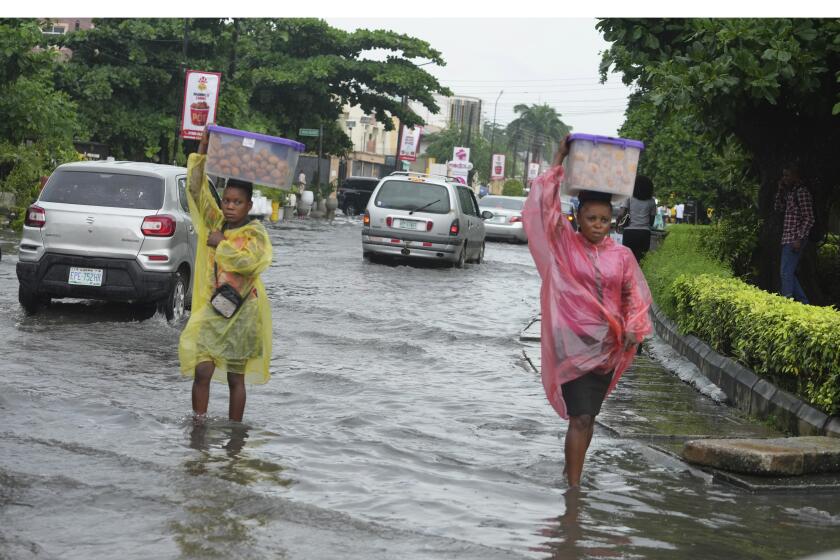2 S. African Blacks Find Freedom and Fear Coexist : Reforms: A prisoner gets his release. A shack dweller finds that violence has created a living hell.
Fuzile Tsewu, doing six years’ hard time for terrorism, watched the prison TV in disbelief a year ago when the government freed Nelson Mandela and promised, once and for all, to get rid of apartheid.
Tsewu was usually skeptical of South Africa’s white leaders, but he couldn’t help hoping for an early release. And he got his wish a few weeks ago when he boarded a ferry to leave the Robben Island penal colony and rejoin his family here in New Brighton township.
A thousand miles away, in a township known as Tokoza, James Dywili also had been cheered by the government’s promise of a “new South Africa.” Dywili hoped it would mean he could move out of his corrugated-iron shack and, he said, “lead a normal life.”
But today Dywili’s shack lies in ruins, burned to the ground in black fighting spawned in large part by those reforms.
Everything Dywili owned, from the vegetables and chickens in his corner store to his children’s school uniforms, was destroyed. And he now walks the streets afraid for his life.
This is the story of two black men, a prisoner and a shack dweller, whose lives were touched by the most hopeful and violent year in South African history.
Few black South Africans have escaped the radical, but often confusing and unsettling, transformation this country has undergone in the 12 months since President Frederik W. de Klerk legalized anti-apartheid organizations and freed Mandela.
Back then, it was illegal to wear an African National Congress T-shirt or wave an ANC flag or speak from an ANC podium. Today, the black liberation group’s banner is openly displayed in the streets and ANC leaders--formerly prohibited from being pictured or quoted inside the country--are seen gripping the hands of government officials on newspaper front pages.
A year ago, blacks couldn’t swim in community pools, borrow books from the libraries in “whites-only areas” or picnic in white parks. That, too, has changed, and more change is in the offing.
But along with the reforms have come signs that genuine peace and equality is still only a dream for most black South Africans.
A few black children who had the temerity to use pools and parks in white areas a few months ago, for example, were beaten up by right-wing whites. In another case, a black man was shot to death by police in an anti-apartheid protest march in Johannesburg--only to cross the racial divide by becoming the first black person buried in a whites-only cemetery.
Blacks themselves, long denied a democratic voice in politics, also have had trouble adjusting to the new era of free political expression. One thousand blacks have been killed in factional fighting around Johannesburg since August.
Some black people, like former prisoner Fuzile Tsewu, have gotten a taste of a better life. But for many others, like James Dywili, life today is worse, much worse, than before.
“People believed that Mandela and the others could bring peace,” Dywili said recently. “But it has turned out to be something horrible, something that makes you so confused that you don’t know what is happening.”
Peter Hortop, a white priest in Tokoza, about 20 miles from Johannesburg, says 1990 “was a fantastic year for the country. But when you’re living in a situation like this, it doesn’t seem like you’re winning.”
Tokoza’s 140,000 residents, nearly half of whom live in shacks, have been harassed by the white authorities, who cut off the electricity three months ago in a dispute over payments. It hasn’t been reconnected.
At the same time, Tokoza has been racked by clashes between Zulus supporting the Inkatha movement of Mangosuthu Gatsha Buthelezi and ANC supporters. More than 150 died in fighting there in December.
James Dywili, his wife and five children lived in one of 40 shacks crammed onto a Tokoza lot big enough for one average-sized home. Dywili, 64, had moved there 20 years ago to start his own business after working in the gold mines and driving trucks.
By the time President De Klerk announced his reforms a year ago, Dywili had a thriving vegetable and fruit stand in his home, his children were in school and the whole family went to church every Sunday.
Dywili, like many in Tokoza, was heartened by the white leader’s courage and pleased to see the ANC becoming a major force in the country’s politics.
But the budding optimism in Tokoza turned to fear in July when Buthelezi’s Inkatha movement declared itself a national political party and went on a recruiting drive in Tokoza and other Transvaal Province townships. Inkatha, previously a Zulu cultural organization based in Natal Province, has long been at odds with the ANC.
Soon, the community was divided between permanent residents, who mostly supported the ANC, and recently arrived Zulus who lived in overcrowded single men’s dormitories, or hostels, in the township.
No one knows who started the trouble but, by August, Zulus in the hostels and ANC supporters in a large squatter camp were locked in combat. The Zulus focused their attacks on the Xhosa ethnic group, of which Mandela and many other leading ANC figures are members.
Dywili, who is a Xhosa, watched with growing concern. He stopped going to the Anglican church near his home because, he said, “there are many Zulus there.” And he began thinking about moving.
By November, he had saved enough to make an $800 down payment on a new $15,000 house outside Tokoza. But before he could move in, the faction fighting had spread to his small squatter camp.
On Dec. 2, a mob opened fire on his shack, and Dywili and his family crouched in a corner as bullets ricocheted inside. No one was hurt and the attackers soon left.
But six days later, Dywili looked out his door and saw the whole camp was ablaze. The family fled and Dywili ran to nearby houses, knocking on doors and screaming for help. No one would let him in.
When he returned the next day, the camp was flattened. All the family’s possessions were destroyed, including Dywili’s inventory and life savings of $800. All he had to his name was a two-room, unfurnished home on the outskirts of town--with a monthly mortgage payment of $250.
Today, Dywili and his family sleep on the concrete floor in that house and use candles for light. He collects scrap metal from the streets and sells it to put some food on the table. A new church, in a safer area of town, sometimes gives him rice and tea. And he’s applying for jobs as a truck driver again, to avoid eviction.
“There is no freedom in the townships today,” Dywili said recently. “If I was free, I could carry on with my business, be a law-abiding citizen and attend my church. But the freedom is being stopped by the violence.
“I still have a very high hope that things will be all right,” he added. But, for now, he’s worried.
“Inkatha men have a whole list of people who are known to be Xhosa,” he said. “They have my name very well. I think so.”
For the 350 inmates on Robben Island, the home of South Africa’s political prisoners, the early optimism over De Klerk’s reform plans faded quickly.
Many inmates had hoped that Mandela’s release, a year ago, would open the gates for others. But when no one else was freed, the prisoners went on a hunger strike. It was called off 11 days later when the government and the ANC agreed to their first-ever talks.
Several months passed, though, and the prisoners’ hopes were raised again and again. Everyone figured they’d be out soon.
Fuzile Tsewu noticed that the guards, formerly cool and distant, had become friendly. The prisoners’ newspapers, for years clipped to shreds by the censors, began to arrive intact. Inmates even were allowed to wear ANC T-shirts and the ANC colors of green, black and gold.
But no one unlocked the prison door.
The inmates, who found comfort in the day-to-day sameness of life behind bars, were frustrated by their uncertain future. They became preoccupied with newscasts, staying up until 1 a.m. for the final radio bulletins and rising at 6 a.m. for the first, each time hoping for word of their fate.
Tsewu, a 41-year-old father of three, had been arrested in 1985 at his home in New Brighton, near Port Elizabeth on the southern coast of South Africa. A former employee of the Ford Motor Co. there, he had been a union organizer and ANC activist.
The arresting officers found two hand grenades behind some dishes in a kitchen cupboard. Tsewu was convicted in 1987 and sentenced to six years.
While Tsewu was in prison, his wife, Emma, pumped gas at a service station, sold ice cream from their back yard and drew heavily on the family’s savings. In Mrs. Tsewu’s first visit to prison after De Klerk’s reform speech, Tsewu spent much of their 40 minutes together trying to dampen her optimism.
“Please don’t be too hopeful,” he warned her. “We know these people (government leaders).”
“You long to see your family and you think that you will be out soon,” Tsewu said later. “But you don’t know. Because sometimes there is talk, and even agreement (between the ANC and the government). But when it comes to practicalities, the thing is not done.”
The Tsewu family’s hopes peaked in August, when the ANC agreed to suspend its guerrilla war in exchange for a government promise to free all political prisoners.
A few prisoners were freed but the expected flood of releases didn’t materialize because of disagreements between the ANC and the government over who qualified as a political prisoner. The ANC identified several thousand political prisoners; the government estimated there were only several hundred.
“We were sort of hoping, but at the same time we had to remind ourselves--you can’t trust these (government) people,” Tsewu said.
Shortly before Christmas, Tsewu was in the prison TV room again when he heard one of the guards calling his number. The next morning he and 25 other inmates were free.
A few days later, the ANC issued a statement, demanding that the remaining 230 inmates on Robben Island and the political prisoners elsewhere in South Africa be released by April 30. ANC leaders think the government may meet the deadline.
“I’m much more hopeful about the future now that I’m free,” Tsewu said, relaxing with his children in his two-room home. “But when I see all these shacks our people live in and the inferior education our children are receiving, I realize there is still a big job to be done.”
When he wakes up some mornings these days, Tsewu forgets that he’s no longer in jail. He breathes a sigh of relief when he realizes he’s home. But his thoughts are of those left behind.
“I’m happy to be out,” he said, “but you can’t help but think of all those comrades still living in those same conditions.”
More to Read
Sign up for Essential California
The most important California stories and recommendations in your inbox every morning.
You may occasionally receive promotional content from the Los Angeles Times.







